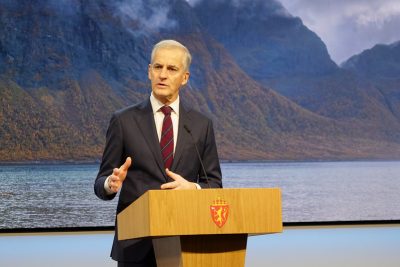Prime Minister Jonas Gahr Støre can’t seem to win these days. Just as his Labour Party crashed in public opinion polls again, Støre also had to fend off more criticism over both his government’s climate goals and his plans for meeting them.

The goals were sharpened just before Støre flew off to Sharm el-Sheikh to take part in the UN’s latest climate conference. Støre’s minister in charge of climate and the environment, Espen Barth Eide, claimed that Norway now plans to cut its emissions by 55 percent by 2030, compared to 1990 levels. The goal had been 50 percent.
The challenge is that emissions last year were only 4.7 percent lower than in 1990, and that was mostly because Equinor’s huge gas plant at Melkøya outside Hammerfest was still closed after a devastating fire in 2020. Emissions from other industry, agriculture and road transport went up.
It remains unclear exactly how such ambitious cuts can be made. Støre points to large carbon capture projects now underway around Norway, along with lots of measures to further discourage driving and use of the fossil fuels that Norway itself produces. Environmental organizations and several Members of Parliament are skeptical.
“It’s very good that the government is raising its climate goals,” Lars Haltbrekken, climate policy spokesman for the Socialist Left Party (SV), told news bureau NTB. “Unfortunately, the government has proposed a state budget that neither meets the old goals or the new goals. We’re heading towards an increase in climate gas emissions in Norway now.”
The Greens Party agreed, noting that the government lacks “concrete measures” to meet the goals, not least because of Norway’s oil and gas industry. Even the conservative opposition Progress Party, which has long supported the oil industry, accused Støre’s government of being more keen on generating praise for ambitious goals than supporting measures to meet them.
‘Confidence crisis’
Only one out of seven Norwegians, meanwhile, has any faith in politicians’ climate goals. A recent survey conducted by research firm Opinion for the Norwegian Red Cross showed that only 15 percent of Norwegians think Norway will cut its emissions by 55 percent over the next eight years. Fully 64 percent don’t think the government will meet its goals. Only another 15 percent think Norway will be climate neutral by 2050.
Red Cross leader Bernt Apeland thinks the poll reveals a “deep confidence crisis” on climate matters. “The numbers show we haven’t managed to have an honest conversation about what needs to happen in order to meet such ambitious goals,” Apeland told newspaper Aftenposten. “Norwegian politicians have been cowardly and lacked enough self-confidence themselves.”
Prime Minister Støre was also criticized after delivering his speech at the UN climate conference (COP27) last week, regarding measures to finance damage caused by climate change in developing countries. “Støre repeated old promises about climate finance that are not followed up in his proposed state budget,” Truls Gulowsen, the former Green Peace leader who now heads Norway’s chapter of Friends of the Earth, Naturvernforbund. “Nor is Norway on track to meeting its climate goals.”
‘Not good enough’
Håkon Grindheim of Kirkens Nødhjelp (Norwegian Church Aid) bluntly claimed Støre’s speech “wasn’t good enough” and called for more concrete support for the countries hardest hit by climate change. “Norway is lagging far behind what we view as its fair share of responsibility (as an oil-producing nation),” Grindheim told newspaper Dagsavisen. He also stressed that global climate goals won’t be met until developing countries get the help they need to carry out climate measures.
Norway continues to have a credibility problem, both at home and abroad, and its windfall oil and gas profits that are directly tied to Russia’s war on Ukraine don’t help. Støre and his government keep resisting calls to donate profits from high gas and oil prices, claiming he won’t regulate Norway’s contribution based on the “swings” in gas prices. He stresses instead how oil companies in Norway already pay nearly 80 percent tax on their earnings on “an important export” to Europe.
“But we recognize our responsbility and will show solidarity with other countries,” he added. “We donate a high level of foreign aid and that will continue to increase.”
Støre was busy at the UN climate conference, moving from meeting to meeting, holding lots of quick exchanges with other government leaders and speaking about Norway’s role. Many other countries still view Norway as a major contributor to global climate efforts. There’s also renewed hope that the defeat of the former Brazilian president, Jair Bolsonaro, will revive Norwegian aid to preservation of the rain forests in the Amazon. Norway has paid more than NOK 8 billion to Brazil’s rain forest programs but aid was frozen in 2019 because of Bolsonaro’s policies that were not climate friendly.
Norwegian oil company Equinor’s decision to postpone development of the Wisting oil field in the Arctic has also been hailed as “a good decision” that’s expected to affect other projects in sensitive Arctic areas. Both Støre’s Labour-Center government and the Conservatives-led government before it had supported the highly controversial Wisting project, prompting newspaper Dagens Næringsliv (DN) to editorialize that “Prime Minister Jonas Gahr Støre is probably breathing a sigh of relief” because it was so controversial and lacked public support. After Labour’s dismal standings fell again, to a record-low 16.9 percent in another poll last week, Støre can at least avoid more criticism over Wisting as he tackles tough state budget negotiations for the rest of this month.
newsinenglish.no/Nina Berglund

